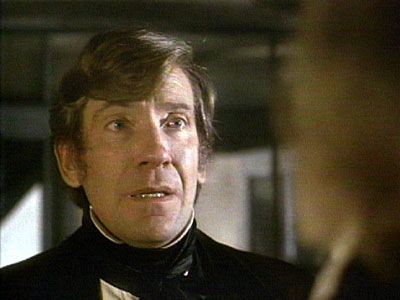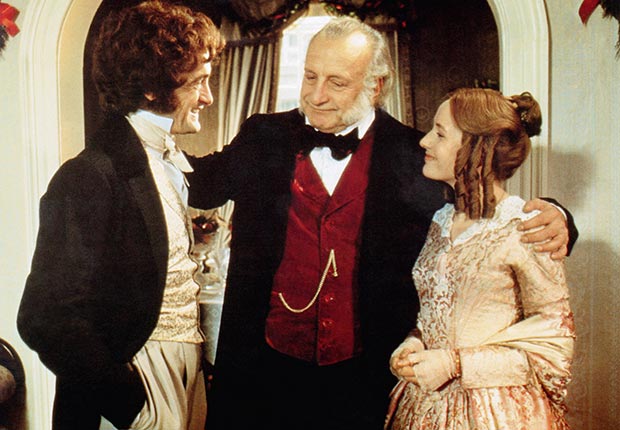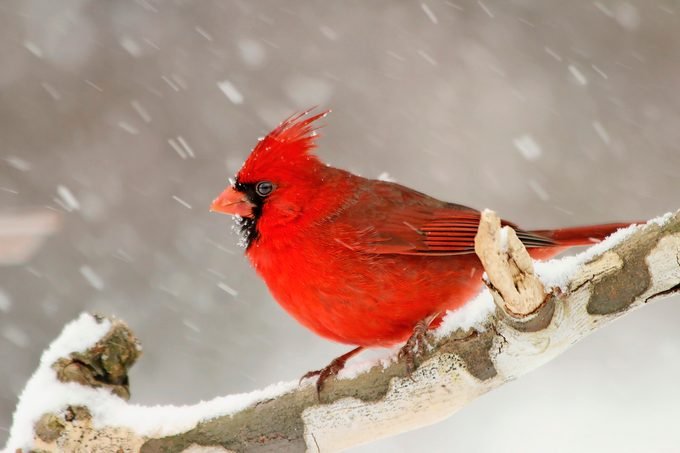Without question, my favorite cinematic adaptation of A Christmas Carol is the 1984 version with George C. Scott as Scrooge. While remaining very faithful to the book, it adds some relevant dialogue and fleshes out some characters, or introduces some new ones, as all dramatic adaptations do. Everyone knows Bob Cratchit and his son Tiny Tim, but we are introduced to Messrs. Poole and Hacking, the two charitable gentlemen who Scrooge initially rudely rebuffs, but eventually befriends. We also meet a homeless couple, Ben and Meg (to whom I have given the surname of Greer), whose family the invisible Scrooge encounters towards the end of his supernatural jaunt with the Ghost of Christmas Present. In these Added Staves that follow, we suppose what transpired with these characters in the days following Mr. Scrooge’s conversion; because A Christmas Carol is nothing less than a conversion tale.
I dare not presume that the following lines are anything that even approaches the genius of Mr. Dickens, except for the last few, which have been “lifted” from him without apology.
Stave Six
It was a most uncomfortable dinner that Bob Cratchit shared with his employer at the Four Coopers Tavern on that Boxing Day. Understandably so, since Mr. Ebenezer Scrooge had never so much as shared a cup of tea or biscuit with his clerk in all the years that he had him in his employ. But also because of the singular joviality with which Mr. Scrooge recounted the previous day’s revelry that he had enjoyed at his nephew Fred’s home. “The man is indeed human after all,” thought Bob.

Then suddenly Scrooge’s face took on a serious look. I should not say a grave look, for the light in his eyes still remained; but instead of projecting mirth, they now glowed with kindness.
“Bob, what can be done for Tiny Tim? What do the physicians say?”
“We have only been able to take him to the surgeon in our neighbourhood, a man who is, sad to say (and I repent even as I say it of him), given to much wine. He fitted Tim with the crude crutch that you may have seen—I should not say fitted, for he just repossessed it from another poor lad who, well, no longer needed it in this world—and he said that there was nothing else that he could do for my poor boy.”
“Upon my soul, Bob, I will do everything in my power, God helping me, to see that our dear Tiny Tim WILL recover! Upon my soul, I say, my good man!”
More shocked and astonished than ever, Bob Cratchit could only manage a muffled “Thank you, sir. God bless you, sir.”
***
The following day, an observer at that same Four Coopers would have seen three gentlemen in rapt conversation, alternately laughing robustly, and then displaying the same kind of serious countenance that was seen the previous day in Mr. Scrooge; for indeed that gentleman was one of the party on this day as well. The other two gentlemen, Mr. Poole and Mr. Hacking, were regaling Mr. Scrooge with cheerful stories of benevolence, modestly leaving their names out of them, although they were principle players. For that is what they did.

“I say, my new friends,” proclaimed Scrooge, “I never knew such men as you, and such good works as these, still existed in this old town. It brings to mind the story I remember hearing as a child, about ‘unto the least of these.’”
“Indeed, it is Our Lord’s very words that compel us, Sir.”
“Call me Ebenezer, please, for I foresee that we shall be spending much agreeable time together in coming days. Tell me, my good men, have you ever been acquainted with a young family, in the vicinity of Whitechapel I believe it was, a man and wife who go by the Christian names of Ben and Meg? I was made aware of their desperate circumstances on a recent excursion (a trivial tale, not worth the recounting) and I would like to offer them employment in my home. I have gone a long time without the assistance of a useful man of the house, or even a housekeeper. I am not aware of their surname, or a way in which I can contact them.”
“You could very well be referring to Ben and Meg Greer. They have two children–”
“A boy and a girl!”
“–Precisely, a boy and a girl, but they have recently been turned out of their rooms. They are good-hearted people, honest working folk, but I’m not sure that they are used to the type of work that you describe–”
“Oh to be sure, my good friends, I am certain that we could all, as it were, ‘grow’ together, Mr. and Mrs. Greer and I! Learn on the job, you might say! And as for the boy and the girl, they could help out as sort of ‘apprentices’, as long as it does not intrude on their schooling, which I would also intend to provide. Can you tell me where I might find the Greers?”
Upon receiving satisfactory directions as to their potential whereabouts, Scrooge then addressed another matter that was pressing on his heart.
“My clerk has a son, dear Tiny Tim, who is quite feeble, and unable to walk without the use of a crutch, and I would like to do what I can to help the poor lad. Do you know of any physicians who have seen success in curing boys like Tim?”
“Indeed, Ebenezer, we know of just the man, a pioneer in the field, and a friend of ours (and truly one of the best friends of the poor that we know this side of heaven) who has seen much success with cases such as you describe.”
“Then we must see him at once!”
“I fear that he is a long way off, in Scotland. He keeps an office in Edinburgh.”
“Then I will take the boy and his father to Edinburgh by the next available means. Can I be so bold, given the short length of our friendship, as to request that you would initiate a correspondence with this good physician on my behalf, as early as today, if it is indeed possible?”
“Yes, Sir—Ebenezer–we will put pen to ink this very afternoon.”
Stave Seven
Just a few days later, Scrooge, accompanied by his nephew Fred Holywell and their friend Mr. Topper, arrived by carriage in the neighbourhood of Whitechapel.
“Wait here, my good man,” said Scrooge to the driver, “and I will see to it that your time will be well-paid for.”
“If they don’t steal the wheels out from under me first,” the driver muttered under his breath. If Scrooge heard the remark, his continued smile indicated otherwise.
The three men had not long been alighted from the coach before they espied a young girl peddling flowers.
“I say, that may be her!” exclaimed Scrooge. “My dear, that’s a good girl, are you the child of Ben and Meg Greer?”
On hearing the names of her parents, the poor girl dropped her box of flowers, and ran off down the dirty street, before ducking down a side alley and bursting through the front door of a small dissenting chapel.
Upon knocking at the chapel door, the three men were confronted with the stern look of a young parson.
“May I ask what your business might be here, gentlemen?”
“I assure you, my good man,” replied Scrooge, “our business is wholly benevolent in nature. I only wished to inquire of the child for directions to her parents, Mr. and Mrs. Greer, to whom I wish to offer employment.”
After Mr. Holywell explained to the Parson the details of the proposed arrangement, including the living quarters, and the schooling of the children, along with a reference to their association with Mr. Poole and Mr. Hacking, the Parson was satisfied enough to call the child from her place of hiding.
“Mary, there’s a good lass, it’s all right, these men are friends, run and fetch your mother and dad and bring them here straightaway!”
Mr. Topper, who had picked up the scattered flowers from the street, was unsuccessful in conveying them to the young girl before she sped away. But indeed, she would no longer have need of them.
Stave Eight
A fortnight or so later, Mr. Scrooge, Bob Cratchit, and Tiny Tim were aboard the north-bound train headed for Edinburgh. Poor Bob Cratchit could not help himself from spontaneous expressions of apology to his employer for “the extreme imposition, and inconvenience, and monetary cost…” etc., etc., and then switching to ebullient gushings of sincere, heart-felt gratitude. Mr. Scrooge, in order to distract his clerk from lapsing into these constant vocal swings of the pendulum, would gently redirect Bob’s attention to those subjects that mattered to him most. “I want to hear more about that son Peter of yours; he sounds like a fine young man, a promising young man…” or, “tell me about your daughters, they all sound like such charming young ladies, what are their names again?…” As for Tiny Tim, who had never so much as set a foot outside of a one-mile radius from his house in Camden Town, the view of the passing countryside as seen from the train window was, in a word, spellbinding. Hypnotizing. Mesmerizing. There, I have actually used three words.

***
Tiny Tim sat contentedly nibbling the biscuits that Dr. Samuel McKnight had given him in appreciation for his typical “good as gold” behaviour during the thorough examination that had just been completed.
“Gentlemen, I have seen many children with cases like this, and if I may say with all due modesty, I have been quite successful in bringing about remarkable recoveries. This child is suffering from rickets, brought on by his environment, I’m afraid. Along with the medicine that I will provide here today, and prescribe for future necessity, and the foods that will need to be added to the boy’s diet, I must say–” speaking directly to Bob, “that your boy must be relocated away from his current neighbourhood.”
At this, Bob’s countenance fell, but Mr. Scrooge, whose own visage had brightened with each word that the physician had uttered, quickly sought to set his clerk’s mind at ease.
“Come now, my dear Bob, do you forget that your expectations have greatly multiplied in recent weeks? I will see to it personally that a change in housing to a more agreeable location will be well within your means. Perhaps a move to my own neighbourhood, or to my nephew Fred’s neighbourhood. Granted, they are certainly not ‘Pall Mall’, but I’m sure our good doctor would approve of their environs.”
Bob immediately resumed his train-coach behaviour of alternating protestation and gratitude, until Scrooge, with a smile, cut him off.
“We will discuss the particulars on the train ride back to London. In the meantime, will you be so good as to flag us a coach to convey us back to our inn? I have just a few brief matters to discuss with the good doctor, and then I will join you presently. Thank you, Bob.”
After Bob and Tim had left the physician’s office, Scrooge pressed something into Dr. McKnight’s hand
“My dear sir…”
“Call me Ebenezer, please.”
“My dear Ebenezer, this far exceeds the amount that this consultation and medication typically require…”
“I will hear no more of it, my dear Doctor. The hope that you have given us this day…if I had access to Her Majesty’s own strongbox…”
“I must tell you in confidence that without your ministrations, Ebenezer, I fear this child would not have–”
“Lived to see another Christmas; yes I am convinced of that same dread thought.”
“The treatments I have prescribed will indeed have positive effects, but what would certainly set this boy aright would be a month at the seaside, if means would allow for it. A month at the sea, and his father may likely see the child twirling that crutch over his head by the time he is ready to return home.”
“A trip to the sea, to cure the old sailor’s malady…very ironic, eh?”
“It is indeed, my friend.”
***
“As soon as the weather allows for it, you and Tim are to take a month’s holiday in Kent, at the seaside.”
“But sir, with all you’ve already done…and how will you manage…”
“Bob, I already see the need to add another man to assist us in our business endeavours. I am confident that he will learn the job in your absence, and will prove to be a valuable asset upon your return.”
“Dear Mr. Scrooge, how can I ever…”
“Tell me once again about that delightful Belinda, what a joy she must be to you and Mrs. Cratchit…
***
Tiny Tim was indeed employing his crutch in creative ways well before the end of his seaside trip with his father. Although never actually twirling it over his head, he delighted in tossing it into the surf, and watching to see how it would float and then return to him with the tide. On the journey back to London, on more than one occasion, the coach nearly left before Bob and Tim realized that the soon-to-be redundant crutch had been left behind at their most recent stopping-place. The crude implement eventually met a mischievous end in the Cratchits’ new fireplace.
***
Today you may find Mr. Timothy Cratchit, who grew to be the tallest of the Cratchit siblings (who still call him Tiny Tim as a loving good joke), busily-engaged alongside his brother Peter in the supervision of the bustling, and prosperous, offices of Scrooge, Marley, & Cratchit. Tim is married to my dau—I should say, the daughter of Scrooge’s nephew Fred Holywell. Felicity is her name, and felicity is the perfect description that could be given to the atmosphere of their home, which is also populated by four little darlings, the eldest a boy who goes by the name of Ebby.
As for Mr. Ebenezer Scrooge, he became as good a friend, as good a master, and as good a man as the good old City knew; and it was always said of him that he knew how to keep Christmas well, if any man alive possessed the knowledge. May that be truly said of us, and all of us! And so, as Tiny Tim observed, God bless Us, Every One!
THE END









